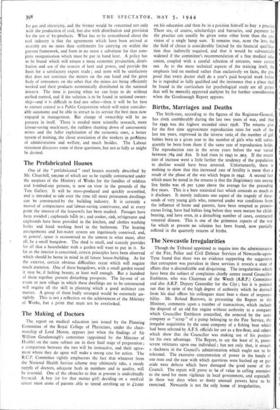The Making of Doctors
The report on medical education just issued by the Planning Committee of the Royal College of Physicians, under the chair- manship of Lord Moran, appears just when the findings of Sir William Goodenough's committee (appointed by the Minister of Health) on the same subject are in their final stage of preparation ; a comparison between the two will be instructive, and their agree- ment where they do agree will make a strong case for action. The R.C.P. Committee rightly emphasises the fact that whatever form the National Health Service scheme may ultimately take, a steady supply of doctors, adequate both in numbers and in quality, will be essential. One of the obstacles to that at present is undoubtedly finpncial. A boy (or for that matter girl) deciding on a meelical career must come of parents able to spend anything up to £2,000
on his education and then be in a position himself to .buy a practice. There are, of course, scholarships and bursaries, and payment fer the practice can usually be given some other form than the pre. vision of a single lump sum. It remains true, none the less, that the field of choice is considerably limited by the financial qualifica- tion thus indirectly required, and that it would be substantially widened if the committee's recommendation of a free medical edu- cation, coupled with a careful selection of entrants, were carried out. As to the more technical aspects of the training itself, the emphasis laid on method rather than exclusively on facts, the pro- posal that -every doctor shall do a year's paid hospital work before he is regarded as fully qualified and the insistence that a place shall be found in the curriculum for psychological study are all points that will be mentally approved andvut by for further consideration when the Goodenough Report appears.






















 Previous page
Previous page